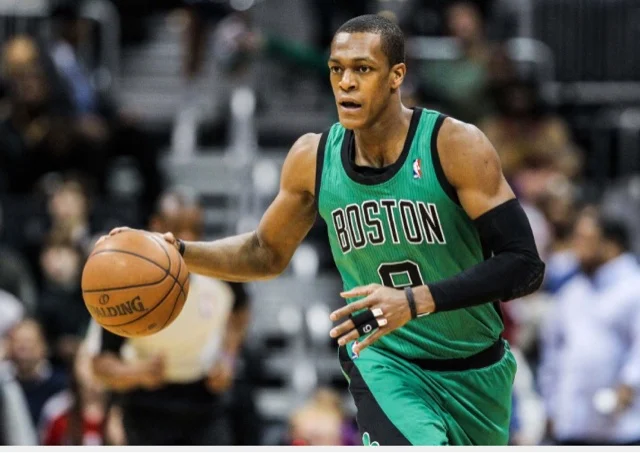Connect five (years): what the Celtics final offer to Rajon Rondo means for their future
 |
| Here we see The Rondo in his natural green |
Well, apparently, the Celtics made a serious effort to keep Rondo in his natural colors*. Via Marc J. Spears of Yahoo.com:
Rondo was in the final year of a five-year, $55 million contract with the Boston Celtics when last season began. He was the last player remaining from Boston's 2008 NBA championship team and appeared receptive to a contract extension. But after Rondo turned down a five-year extension estimated to pay close to $70 million in hopes of landing a maximum contract later, he was traded to the Dallas Mavericks on Dec. 18.
Rondo’s disastrous stint in Dallas continued a trend of general decline in his play. Rondo’s field goal percentage was the lowest it has been in a season in which he played the majority of games, and his free throw percentage was a cover-your-eyes-or-risk-a-face-melting sub 40 percent.
And with even Rondo admitting he hadnt given real effort on defense for years, his performance on that end in Dallas raises the twin possibilities that he either continued not paying attention to that end of the floor or, more disconcertingly, has simply seen his defensive skills erode with time.
Bearing all this in mind, and including the fact that the kings were the only team with major interest in the mercurial floor general and still only gave him a one year deal for $9.5 million, it sure seems like the Celtics dodged a bullet when Rondo turned down that 70 million dollar offer -- and that is without mentioning that trading Rondo netted them Jae Crowder and a first round pick.
However, a more subtle story line lays inherent in the leaked deal which Rondo reportedly turned down, and it is one that will have repercussions for the Celtics in the near future.
First, the contract Spears mentions is a good-faith offer of what Rondo’s market was at the time coming off an ACL injury and mired in a pretty uninspiring campaign. This may seem obvious, and even unimportant, but one must bear the Celtics history in mind both with their recent treatment of their stars and in free agency in general to understand the implications of that statement.
No one would say that the Celtics treated Kevin Garnett and Paul Pierce unfairly in shipping them to Brooklyn for a horde of draft picks and Billy King’s immortal soul, because it gave both a chance to fight for another title. But many have levied accusations against the Celtics that they mistreated both Rondo and Ray Allen by dangling them in trade offers for years (sources around Allen confirmed he felt disrespected by the Celtics treatment of him before his defection to the Heat).
One of the central tenets of Danny Ainge’s rebuilding process has been the accumulation of cap space to pursue both trade and free agent acquisitions of top-tier talent. But cap space is only useful if someone wants to take it, and with Boston often being lamented as a dead zone for major free agents, any factor that further turns stars off from joining the franchise is a rather major problem.
Stop and think about it for a second; if you were Greg Monroe this past offseason, or (just as an example of a major free agent) Kevin Durant this summer, Boston already has plenty of factors working against it. If you add on top of that a feeling that the organization mistreats its star players, what motivation is there left to sign with a rebuilding team in a cold-weather region with exceedingly high taxes?
Report: Greg Monroe Agrees To Max Deal With Bucks: Cross another one off of the Celtics free agent wish list. http://t.co/Z71Czijx8g
— Boston Daily News (@BostonDailyNews) July 2, 2015
This is where the leaked Rondo offer comes into play. While they didn't offer Rondo the max, no sane person would have. Rather, they offered Rondo a very fair deal and only traded him when he made it clear he no longer wanted to be in Boston. This could be a great counterpoint in pitches to prospective free agents who are worried about the Celtics recent legacy of moving established veterans and treating every member of the roster as expendable (a counterpoint, I might add, that would certainly be buoyed if the C’s were to hold on to Isaiah Thomas and his eminently tradable contract rather than moving him as many have suggested they might).One of the most brilliant aspects of Danny Ainge’s rebuild since the departures of the team’s old guard has been the flexibility he has maintained, both in terms of draft capital and cap space. With the final offer Boston gave Rondo before shipping him into Rick Carlisle’s doghouse being leaked, it may just signal to stars on the move around the NBA that the Celtics are serious about not just acquiring high end talent, but keeping it around for the long haul.
*Note: The five year offer to Rondo means the Celtics were willing to make him their so-called Designated Player. Each franchise can sign only one player to a five-year contract under the current collective bargaining agreement, and cannot sign a deal of the same length with another player until that contract has either run out or been traded off the roster.
Contract details courtesy of spotrac.com
Statistics courtesy of basketballreference.com
Photo courtesy of gamedayr.com
Statistics courtesy of basketballreference.com
Photo courtesy of gamedayr.com
Follow Brenton on twitter @BBTruth8294

















